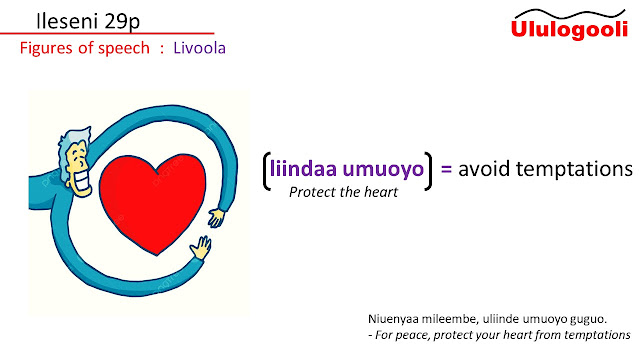Featured
- Get link
- X
- Other Apps
Lesson 29 : Livoola [Figures of Speech]
In most instances Ululogooli uses two or more words to communicate. To mean if any of the two or more words is changed, the result meaning can be interpreted different.
With many of such words, this makes Lulogooli one of the rich expandable languages in view that the many nouns and verbs can be joined in changing ways for increased communication.
An example is “heenza vulahi” for “see well”. While on the surface it would mean asking someone to relook, Valogooli use this to ‘caution or warn’ against a certain behavior that may result in regret.
The two or more words have little literal meaning or sense. It is the interpretation or collective meaning that gives weight to it.
An example is “lola ihale” for “see far”. The words “lola” and “ihale” are in themselves simple. But when combined they are here used to mean “plan well” or “prepare adequately for the future”.
The two examples above can be said to make Lulogooli colourful and by application one does sound “native”. A person who does not understand Lulogooli or knows little application would find it strange to learn or fail to understand the communication.
In Lulogooli, the nature of using two or more words to communicate is “Livoola”, simply interpreted as “telling”. Its equivalent in English is “idiom”.
Why “Livoola” is important is also to communicate on sensitive topics as sex, death or wealth. Plain speaking, as observed in Lulogooli, is not a wise thing.
An example is “geenda ichoova” which is literal for “walk outside”. Valogooli understand it for “fornication”, where one or both partners in marriage still have sex outside marriage.
With “Livoola”, Ululogooli can be found to break syntax rules of grammar. An example is “imoni adenya gutu ahoza.” Here the sentence may not be structurally drawn to Noun + Verb but Noun + Noun + Noun + Noun.
- Get link
- X
- Other Apps
Comments





















Good
ReplyDeleteugaase
DeleteUmuyiinzi mulali amwaavo
ReplyDelete